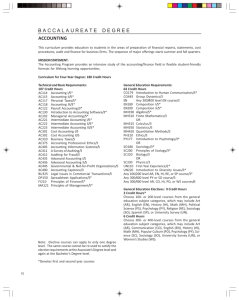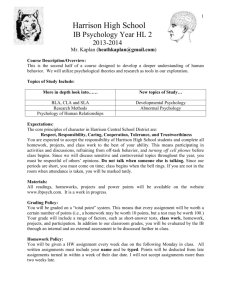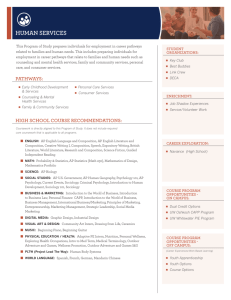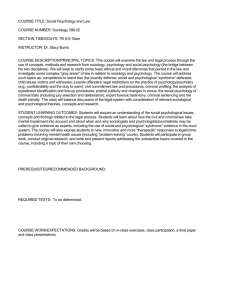Syllabus–Psychology and Sociology
advertisement
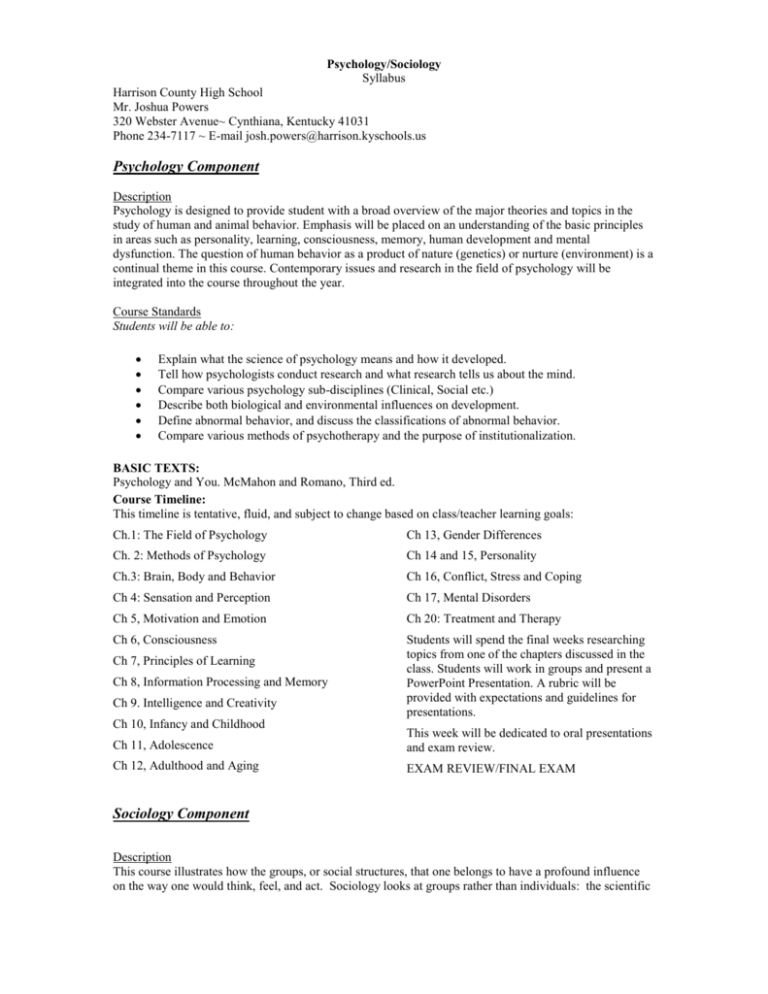
Psychology/Sociology Syllabus Harrison County High School Mr. Joshua Powers 320 Webster Avenue~ Cynthiana, Kentucky 41031 Phone 234-7117 ~ E-mail josh.powers@harrison.kyschools.us Psychology Component Description Psychology is designed to provide student with a broad overview of the major theories and topics in the study of human and animal behavior. Emphasis will be placed on an understanding of the basic principles in areas such as personality, learning, consciousness, memory, human development and mental dysfunction. The question of human behavior as a product of nature (genetics) or nurture (environment) is a continual theme in this course. Contemporary issues and research in the field of psychology will be integrated into the course throughout the year. Course Standards Students will be able to: Explain what the science of psychology means and how it developed. Tell how psychologists conduct research and what research tells us about the mind. Compare various psychology sub-disciplines (Clinical, Social etc.) Describe both biological and environmental influences on development. Define abnormal behavior, and discuss the classifications of abnormal behavior. Compare various methods of psychotherapy and the purpose of institutionalization. BASIC TEXTS: Psychology and You. McMahon and Romano, Third ed. Course Timeline: This timeline is tentative, fluid, and subject to change based on class/teacher learning goals: Ch.1: The Field of Psychology Ch 13, Gender Differences Ch. 2: Methods of Psychology Ch 14 and 15, Personality Ch.3: Brain, Body and Behavior Ch 16, Conflict, Stress and Coping Ch 4: Sensation and Perception Ch 17, Mental Disorders Ch 5, Motivation and Emotion Ch 20: Treatment and Therapy Ch 6, Consciousness Students will spend the final weeks researching topics from one of the chapters discussed in the class. Students will work in groups and present a PowerPoint Presentation. A rubric will be provided with expectations and guidelines for presentations. Ch 7, Principles of Learning Ch 8, Information Processing and Memory Ch 9. Intelligence and Creativity Ch 10, Infancy and Childhood Ch 11, Adolescence This week will be dedicated to oral presentations and exam review. Ch 12, Adulthood and Aging EXAM REVIEW/FINAL EXAM Sociology Component Description This course illustrates how the groups, or social structures, that one belongs to have a profound influence on the way one would think, feel, and act. Sociology looks at groups rather than individuals: the scientific study of group behavior. We look at the basic social institutions such as the family, religion, education, government, and the economy. We study the changes which are taking place in our society and how these often lead to social problems. Current social problems are examined using the tools and techniques of sociologists. Students choose the problems of particular interest to them from a wide range such as poverty, delinquency, discrimination, deviancy, environmental and population crises, family breakdown, and many more. We search for causes, consequences, and possible solutions to these problems. Course Standards and Objectives: The student will discuss sociology as a behavioral science and be exposed to the development and characteristics of sociology. The student will identify the devices, tools, and methods of research that sociologists utilize (surveys, polls, demographic information, statistics, and the Internet). The student will recognize how values, norms, and sanctions influence the individual and examine ways in which cultures differ, change, and resist change. The student will assess antisocial behaviors, such as crime, social deviance, addiction, and terrorism. The student will evaluate how culture affects his or her personality. The student will describe the cycle of human life, including birth, childhood, adolescence, adulthood, parenthood, middle age, and late adulthood and examine the topics of parenting, aging, and death and dying. The student will discuss and evaluate topics concerning human groups, social stratification, gender roles, microcultures, population, and human ecology. The student will analyze the family structure and functions, such as marriage, roles, divorce, and changing family patterns. The students will examine the need and purpose of social systems and institutions, such as prisons, schools, governments, and religions. The students will examine forms of collective behavior such as mobs, riots, fads, social movements, public opinion, and mass communications. The students will examine major social issues facing modern society BASIC TEXTS: Sociology: A Down-top-Earth Approach Course Timeline: This timeline is tentative, fluid, and subject to change based on class/teacher learning goals. As this course is based on current global issues, what we study is fluid based on current headlines. However, the following broad units and topics will be studied this semester: International Terrorism, Finance, Global Stratification, Sex and Gender, Race and Ethnicity, Religion, Health, Environment, and International Law. Students will spend the final weeks researching topics from one of the chapters discussed in the class. Students will work in groups and present a PowerPoint Presentation. A rubric will be provided with expectations and guidelines for presentations. This week will be dedicated to oral presentations and exam review. EXAM REVIEW/FINAL EXAM Additional Information Students are financially responsible for textbooks assigned. While some “wear and tear” is expected with normal use, the return of a damaged text (including writing in the text) will result in a “damage” charge. Lost texts, extensive damage, defacement, or profanity written in the textbooks, which require the replacement of the text, will result in the student being charged the full price for the text that is damaged. Recommended Material Spiral notebook, Loose-leaf paper, Folder, Flash Drive/Writeable CD, and Writing tools --Please bring all materials to class. Once the bell rings, you will not be able to return to your locker. I will try to remind you of assignments due and materials needed as often as possible. Class Expectations Honesty -You are expected to complete all work yourself, unless working in a group as assigned by the instructor. Cheating and plagiarism (taking someone else’s works, expressions, or ideas and passing them off as your own) are serious offences. Any such offence will result in a score of zero and further disciplinary action. I take both cheating and plagiarism very seriously!!! Respect -This includes not talking while the teacher or any other student is talking. Remember this is our class, not just mine or just yours. As such, we should respect others by not interrupting. Responsibility Students are expected to follow class procedures, including: --Be in seat when the bell rings. --Turn in assignments on time. --Return any communications (i.e. midterm reports, movie permission, syllabus, lab contract) from your parents/guardians to me with their signature. These classroom expectations supplement all other school rules and policies. For further information on school regulations, please consult your student agenda/handbook. Attendance 1. You are expected to attend all class sessions. 2. If you are absent, then you must: a. Bring an admit slip from the attendance clerk before entering the next class. b. The admit slip must indicate the absence was excused. c. Students will have time (the number of days absent + 1) to make up work. In the event that work cannot be made up (i.e. certain group work or “lab” activities), the student’s score will be pro-rated such that the absence will not hurt the grade of the student. This rule only applies to those students with excused absences. Grading Policy Grades are determined based on percentages as set forth by Harrison County High School and the Harrison County School District A 100-92 B 91-83 C 82-74 D 73-65 F 0-64 Grades will be based on: total points earned / the total points possible = grade --Extra Credit There will be extra credit opportunities throughout the semester There will be specific assignments that will be announced in class, including various reading and writing assignments assigned as we progress throughout the year not contained within this tentative class schedule. Tests, Quizzes, Homework, Group Work, Bell Ringers, Projects, Educational Films, and Technology/Computer Lab work, etc: All of these techniques are ways to evaluate your progress in class and your understanding of the material. --In general, and throughout the semester, you will have any combination of the following: Tests, Quizzes, Homework, Group Work, Bell Ringers, Projects, Educational Films and related applications, and relevant computer lab work. There will be specific assignments that will be announced in class, including various reading and writing assignments assigned as we progress throughout the year not contained within this tentative class schedule. You will not have homework every night, and some nights may only require reviewing over the lecture notes from that particular day. When you are assigned homework, it is very important that you turn it in on the day that it is due. Homework is a sizeable percentage of your final grade. And remember…no late work will be accepted unless you have an excused absence!! --We will also be doing some group work. It is important that everyone pull his/her own weight in the group. Do not make others do your work! That is not beneficial for you and it is not fair to your group mates. If I find that you are not participating in the group, I may pull you from the group and you may be assigned an individual project to work on until the group activity is complete. --From time to time when you come to class, there will be a question or quote on the board. You should answer the question on the board as a “bell-ringer.” You will have at least 10 minutes to respond in your notebook. Please write in complete sentences and make each response about a half a page, usually between 5 and 10 sentences. We may discuss some of your responses out loud. As your teacher, I am committed to your educational successes. If it is ever necessary to get in touch with me, please do not hesitate to email or call the school. I will make every effort to schedule a mutually convenient time to meet with you. Our signatures below indicate that we have read and discussed the class procedures of Psychology/Sociology and are responsible for the information contained within this syllabus. _______________________ Signature of Parent/Guardian ________________ Signature of Student __________ Date

